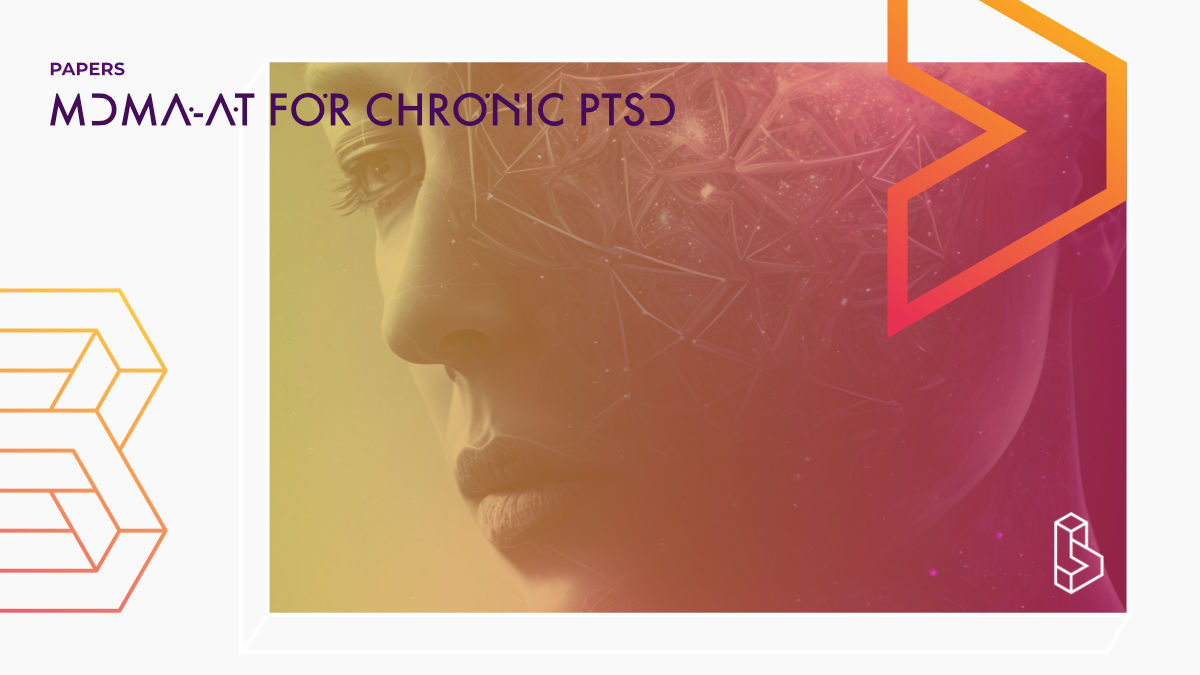This double-blind, between-subjects study (n=26) on the treatment of posttraumatic stress disorder (PTSD) compared the effectiveness of two higher (100-125mg) with one lower dose (40mg) of MDMA in combination with psychotherapy. One month after two sessions, the higher doses of MDMA showed the largest reduction on a PTSD Scale. At the 12-month follow-up, PTSD symptoms remained lower than baseline with 75% of the participants not meeting PTSD criteria.
Abstract
“Background: Posttraumatic stress disorder often does not resolve after conventional psychotherapies or pharmacotherapies. Pilot studies have reported that 3,4-methylenedioxymethamphetamine (MDMA) combined with psychotherapy reduces posttraumatic stress disorder symptoms.
Aims: This pilot dose response trial assessed efficacy and safety of MDMA-assisted psychotherapy across multiple therapy teams.
Methods: Twenty-eight people with chronic posttraumatic stress disorder were randomized in a double-blind dose response comparison of two active doses (100 and 125 mg) with a low dose (40 mg) of MDMA administered during eight-hour psychotherapy sessions. Change in the Clinician-Administered PTSD Scale total scores one month after two sessions of MDMA served as the primary outcome. Active dose groups had one additional open-label session; the low dose group crossed over for three open-label active dose sessions. A 12-month follow-up assessment occurred after the final MDMA session.
Results: In the intent-to-treat set, the active groups had the largest reduction in Clinician-Administered PTSD Scale total scores at the primary endpoint, with mean (standard deviation) changes of −26.3 (29.5) for 125 mg, −24.4 (24.2) for 100 mg, and −11.5 (21.2) for 40 mg, though statistical significance was reached only in the per protocol set (p=0.03). Posttraumatic stress disorder symptoms remained lower than baseline at 12-month follow-up (p<0.001) with 76% (n=25) not meeting posttraumatic stress disorder criteria. There were no drug-related serious adverse events, and the treatment was well-tolerated.
Conclusions: Our findings support previous investigations of MDMA-assisted psychotherapy as an innovative, efficacious treatment for posttraumatic stress disorder.”
Authors: Marcela Ot’alora G, Jim Grigsby, Bruce Poulter, Joseph W. Van Derveer III, Sara G. Giron, Lisa Jerome, Allison A. Feduccia, Scott Hamilton, Berra Yazar-Klosinski, Amy Emerson, Michael C. Mithoefer & Rick Doblin
Authors
Authors associated with this publication with profiles on Blossom
Michael MithoeferMichael Mithoefer is a psychiatrist and a Clinical Investigator and acting Medical Director of MAPS Public Benefit Corporation.
Rick Doblin
Rick Doblin Ph.D. is the founder of MAPS. His persistent work since 1986 has been one of the main drivers behind why psychedelics (including MDMA) are now coming back to therapy.
Institutes
Institutes associated with this publication
MAPSMAPS stands for Multidisciplinary Association for Psychedelic Studies, it's the front runner in making psychedelics a legal way to use (and improve) in therapy.
Compound Details
The psychedelics given at which dose and how many times
MDMA 100 - 125mg | 2x
Linked Clinical Trial
Dose-Response Study of MDMA-assisted Psychotherapy in People With PTSDThis Phase 2 pilot study examined the safety and efficacy of MDMA-assisted psychotherapy in 23 subjects with chronic, treatment-resistant PTSD.

